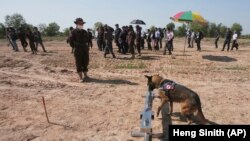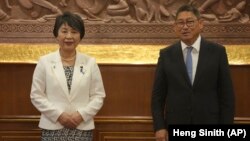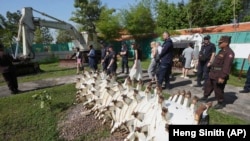Japan's foreign minister on Saturday announced a joint project with Cambodia to share knowledge and technology on land mine removal with countries around the world, including Ukraine.
Foreign Minister Yoko Kamikawa made her comments during a visit to the Cambodian Mine Action Center, which was formed in the 1990s at the end of the Southeast Asian nation's decades of civil war. It seeks to deal with an estimated 4 million to 6 million land mines and other unexploded munitions left strewn around the countryside.
"Cambodia, which has steadily advanced mine removal within its own country, is now a leader in mine action around the world," she noted, adding that Japan has consistently cooperated in Cambodia's mine removal since the civil war.
Cambodian deminers are among the world's most experienced, and several thousand have been sent in the past decade under U.N. auspices to work in Africa and the Middle East. Cambodia in 2022 began training deminers from Ukraine, which also suffers from a high density of land mines and other unexploded munitions as the two-year Russian invasion drags on.
"As a concrete cooperation under the Japan Cambodia Landmine Initiative, Japan will provide full-scale assistance to humanitarian mine action in Ukraine," she said. "Next week, we will provide Ukraine with a large demining machine, and next month, here in Cambodia, we will train Ukrainian personnel on how to operate the machine."
The NGO Landmine Monitor in its 2022 report listed both Cambodia and Ukraine among nine countries with massive mine contamination, meaning they had more than 100 square kilometers of uncleared fields.
Since the end of the fighting in Cambodia, nearly 20,000 people have been killed and about 45,000 have been injured by leftover war explosives, although the average annual death toll has dropped from several thousand to less than 100.
Despite a very active demining program, many dangerous munitions remain in place, posing a hazard to villagers.
Cambodia's training of Ukrainian deminers, in Poland as well as Cambodia, came after former Prime Minister Hun Sen — in an unusual move for a nation that usually aligns itself with Russia and China — condemned Moscow's invasion of Ukraine, saying "Cambodia is always against any country that invades another country."
Cambodia was one of nearly 100 U.N. member countries that co-sponsored a resolution condemning Russia's invasion.
Several other countries, including the United States and Germany, have already provided Ukraine with demining assistance.
Kamikawa also held talks with Cambodian Prime Minister Hun Manet and Hun Sen, his father who stepped down last year after ruling for 38 years.
She and her Cambodian counterpart, Foreign Minister Sok Chenda Sophea, signed agreements for a concessional loan from Tokyo of up to $51.6 million for upgrading the highway between the capital, Phnom Penh, to the border with Thailand, and grant aid up to $2.4 million to support junior administrative officials to study in Japan, a Japanese Embassy statement said.
Kamikawa next goes to the Philippines, where she and Japanese Defense Minister Minoru Kihara will hold talks on Monday with their Philippine counterparts. They are set to discuss signing a mutual defense pact that would allow each country to deploy troops on the other's territory.
























